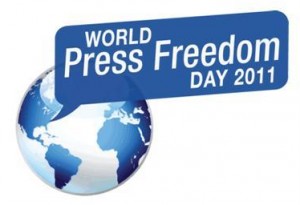Press Freedom and Windhoek – 20 years on
It's worth noting that this year's World Press Freedom Day coincides with the 20th anniversary of the Windhoek Declaration on Promoting Independent and Pluralistic Media.
Take a moment in your day to check out the document.
At a first read though, you could not be blamed for thinking that much of what was noted in point 6 of the declaration could apply in many African countries in 2011.
"In Africa today, despite the positive developments in some countries, in many countries journalists, editors and publishers are victims of repression – they are murdered, arrested, detained and censored, and are restricted by economic and political pressures such as restrictions on newsprint, licensing systems which restrict the opportunity to publish, visa restrictions which prevent the free movement of journalists, restrictions on the exchange of news and information, and limitations on the circulation of newspapers within countries and across national borders. In some countries, one party States control the totality of information."
That view might only be reinforced when we read, for example, how Ugandan journalists were recently targeted by authorities while covering the Walk to Work protests – not forgetting too that social media websites such as Facebook and Twitter were blocked by the government.
However this would be short sighted in weighing up the media across such a vast and diverse continent and over two decades. Far better to take a look at a new briefing paper commissioned by the Media Institute of Southern Africa (MISA).
Media in Africa 20 Years On – Our Past, Present and Future offers some deep insight on African media development. Importantly, its author Professor Guy Berger of Rhodes University, puts the Windhoek Declaration in context – considering both the African media landscape of 1991, and progress made over the past 20 years.
"There has been extensive rise of commercial-private, and to an extent of community-based, media platforms since 1991. But this wonderful progress since 1991 should not blind us to the data which shows that the environment for journalism has taken a turn for the worse since 2000. More effort is therefore needed to establish and maintain enduring systems for journalism to thrive. Windhoek’s standards are thus as important today as ever, in terms of specifying the relevant goals to be achieved. Energies are needed to advance these across context, capital, capacity and knowledge. And this momentum is necessary in the face of both the ongoing challenges and the newly emerging new ones such as the issues of Internet freedom, regulation, access and ethics."
Interestingly at a time when journalists are working more with data or sources such as Wikileaks, Berger also notes the importance of the right to information:
"The earlier demands in Windhoek were that the state should permit the right to free expression through the press and subsequently broadcasting, and these issues understandably dominated the flavour of the two decades after 1991. Today, the other side of the coin is for the state to not just stay out of unwarranted control of information in society, but to also open up its own information resources for public inspection and control. "
A conference will be held in Windhoek later this week to analyze and discuss media in Africa 20 years since the Windhoek declaration.
A number of international media watch-dog organisations have also published their annual reports or new research related to press freedom.
Freedom House's Freedom of the Press Survey for 2011 rates Belarus, Burma, Cuba, Equatorial Guinea, Eritrea, Iran, Libya, North Korea, Turkmenistan, and Uzbekistan as the 10 worst states where "independent media are either nonexistent or barely able to operate".
And the Committee to Protect Journalists has published a report highlighting how governments are developing internet tools to censor reporters as the media increasingly moves online.
If you're online today you can follow the live blog of the World Press Freedom Day conference in Washington on 21st Century Media: New Frontiers, New Barriers.
And don't forget in June, the Deutsche Welle Global Media Forum will also focus on Human Rights in a Globalised World – Challenges to the Media.
Author: Guy Degen





Feedback